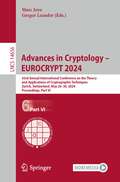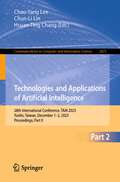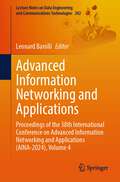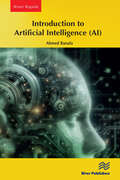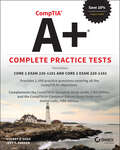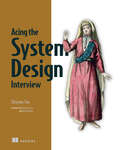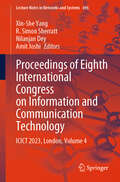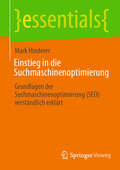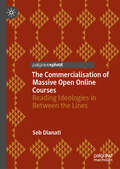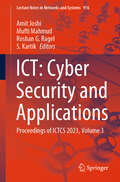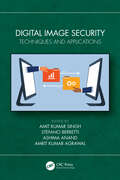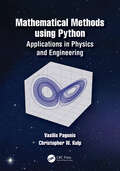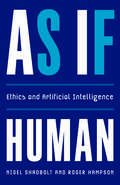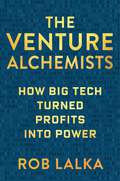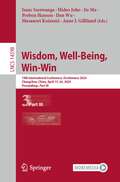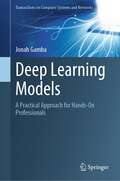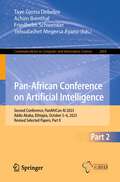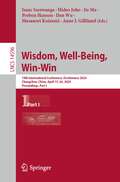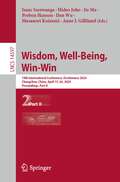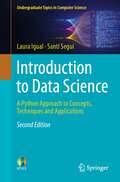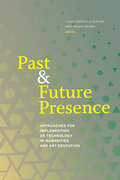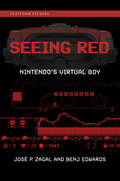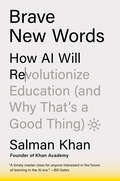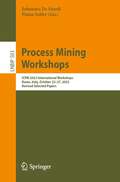- Table View
- List View
Advances in Cryptology – EUROCRYPT 2024: 43rd Annual International Conference on the Theory and Applications of Cryptographic Techniques, Zurich, Switzerland, May 26–30, 2024, Proceedings, Part VI (Lecture Notes in Computer Science #14656)
by Marc Joye Gregor LeanderThe 7-volume set LNCS 14651 - 14657 conference volume constitutes the proceedings of the 43rd Annual International Conference on the Theory and Applications of Cryptographic Techniques, EUROCRYPT 2024, held in in Zurich, Switzerland, in May 2024. The 105 papers included in these proceedings were carefully reviewed and selected from 500 submissions. They were organized in topical sections as follows: Part I: Awarded papers; symmetric cryptology; public key primitives with advanced functionalities; Part II: Public key primitives with advances functionalities; Part III: AI and blockchain; secure and efficient implementation, cryptographic engineering, and real-world cryptography; theoretical foundations; Part IV: Theoretical foundations; Part V: Multi-party computation and zero-knowledge; Part VI: Multi-party computation and zero-knowledge; classic public key cryptography, Part VII: Classic public key cryptography.
Technologies and Applications of Artificial Intelligence: 28th International Conference, TAAI 2023, Yunlin, Taiwan, December 1–2, 2023, Proceedings, Part II (Communications in Computer and Information Science #2075)
by Chao-Yang Lee Chun-Li Lin Hsuan-Ting ChangThis book constitutes the proceedings of the 28th International Conference on Technologies and Applications of Artificial Intelligence, TAAI 2023, which was held in Yunlin, Taiwan, during December 1–2, 2023.The 35 full papers and 12 short papers included in this book were carefully reviewed and selected from 193 submissions. The TAAI 2023 provides a platform for experts and scholars from domestic and international universities, research units, and industries to exchange AI technologies and application results.
Advanced Information Networking and Applications: Proceedings of the 38th International Conference on Advanced Information Networking and Applications (AINA-2024), Volume 4 (Lecture Notes on Data Engineering and Communications Technologies #202)
by Leonard BarolliThe aim of the book is to provide latest research findings, innovative research results, methods, and development techniques from both theoretical and practical perspectives related to the emerging areas of information networking and applications. Networks of today are going through a rapid evolution, and there are many emerging areas of information networking and their applications. Heterogeneous networking supported by recent technological advances in low power wireless communications along with silicon integration of various functionalities such as sensing, communications, intelligence, and actuations is emerging as a critically important disruptive computer class based on a new platform, networking structure, and interface that enable novel, low-cost and high-volume applications. Several of such applications have been difficult to realize because of many interconnection problems. To fulfill their large range of applications different kinds of networks need to collaborate and wired and next-generation wireless systems should be integrated in order to develop high-performance computing solutions to problems arising from the complexities of these networks. This book covers the theory, design, and applications of computer networks, distributed computing, and information systems.
Introduction to Artificial Intelligence (AI)
by Ahmed BanafaIntroduction to Artificial Intelligence (AI) provides a comprehensive overview of the latest trends in artificial intelligence. The book covers the state of the art in AI research, including machine learning, natural language processing, computer vision, and robotics.The book offers a forward-looking perspective on the future of AI, exploring the emerging trends and applications that are likely to shape the next decade of AI innovation. It also provides practical guidance for businesses and individuals on how to leverage the power of AI to create new products, services, and opportunities.Overall, the book is an essential read for anyone who wants to stay ahead of the curve in the rapidly evolving field of AI and understand the impact that this transformative technology will have on our lives in the coming years.
CompTIA A+ Complete Practice Tests: Core 1 Exam 220-1101 and Core 2 Exam 220-1102
by Audrey O'Shea Jeff T. ParkerImprove your understanding of all Core 1 and Core 2 A+ exam objectives and prepare for a new career as a computer technician The Third Edition of the CompTIA A+ Complete Practice Tests: Core 1 Exam 220-1101 and Core 2 Exam 220-1102 offers aspiring and practicing computer technicians essential and practical exam prep material for the industry favorite A+ certification. The hundreds of domain-by-domain practice questions cover all of the A+ exam objectives tested on the Core 1 and Core 2 exams, helping you prepare for success on the tests and in the real world. Just like the real exams, the practice questions contained within this resource cover mobile devices, networking, hardware, virtualization and cloud computing, hardware and network troubleshooting, operating systems, security, software troubleshooting, and operational procedures. These rigorous and realistic practice questions will get you ready for your first role as a computer technician and let you hit the ground running. This comprehensive set includes: Challenging questions designed to advance your understanding and comprehension of all covered exam domains Questions similar to those found on the real Core 1 and Core 2 A+ exams Access to the Sybex online test bank, with hundreds of questions and full-length practice exams Perfect for anyone prepping for the Core 1 and Core 2 A+ exams, CompTIA A+ Complete Practice Tests: Core 1 Exam 220-1101 and Core 2 Exam 220-1102 is also an ideal resource for aspiring and early-career computer technicians who want to improve their understanding of some of the foundational concepts they rely on each day in the field. And save 10% when you purchase your CompTIA exam voucher with our exclusive WILEY10 coupon code.
Acing the System Design Interview
by Zhiyong TanThe system design interview is one of the hardest challenges you&’ll face in the software engineering hiring process. This practical book gives you the insights, the skills, and the hands-on practice you need to ace the toughest system design interview questions and land the job and salary you want.In Acing the System Design Interview you will master a structured and organized approach to present system design ideas like: Scaling applications to support heavy traffic Distributed transactions techniques to ensure data consistency Services for functional partitioning such as API gateway and service mesh Common API paradigms including REST, RPC, and GraphQL Caching strategies, including their tradeoffs Logging, monitoring, and alerting concepts that are critical in any system design Communication skills that demonstrate your engineering maturity Don&’t be daunted by the complex, open-ended nature of system design interviews! In this in-depth guide, author Zhiyong Tan shares what he&’s learned on both sides of the interview table. You&’ll dive deep into the common technical topics that arise during interviews and learn how to apply them to mentally perfect different kinds of systems. Foreword by Anthony Asta, Michael D. Elder. About the technology The system design interview is daunting even for seasoned software engineers. Fortunately, with a little careful prep work you can turn those open-ended questions and whiteboard sessions into your competitive advantage! In this powerful book, Zhiyong Tan reveals practical interview techniques and insights about system design that have earned developers job offers from Amazon, Apple, ByteDance, PayPal, and Uber. About the book Acing the System Design Interview is a masterclass in how to confidently nail your next interview. Following these easy-to-remember techniques, you&’ll learn to quickly assess a question, identify an advantageous approach, and then communicate your ideas clearly to an interviewer. As you work through this book, you&’ll gain not only the skills to successfully interview, but also to do the actual work of great system design. What's inside Insights on scaling, transactions, logging, and more Practice questions for core system design concepts How to demonstrate your engineering maturity Great questions to ask your interviewer About the reader For software engineers, software architects, and engineering managers looking to advance their careers. About the author Zhiyong Tan is a manager at PayPal. He has worked at Uber, Teradata, and at small startups. Over the years, he has been in many system design interviews, on both sides of the table. The technical editor on this book was Mohit Kumar. Table of Contents PART 1 1 A walkthrough of system design concepts 2 A typical system design interview flow 3 Non-functional requirements 4 Scaling databases 5 Distributed transactions 6 Common services for functional partitioning PART 2 7 Design Craigslist 8 Design a rate-limiting service 9 Design a notification/alerting service 10 Design a database batch auditing service 11 Autocomplete/typeahead 12 Design Flickr 13 Design a Content Distribution Network (CDN) 14 Design a text messaging app 15 Design Airbnb 16 Design a news feed 17 Design a dashboard of top 10 products on Amazon by sales volume Appendix A Monoliths vs. microservices Appendix B OAuth 2.0 authorization and OpenID Connect authentication Appendix C C4 Model Appendix D Two-phase commit (2PC)
Proceedings of Eighth International Congress on Information and Communication Technology: ICICT 2023, London, Volume 4 (Lecture Notes in Networks and Systems #696)
by Xin-She Yang R. Simon Sherratt Nilanjan Dey Amit JoshiThis book gathers selected high-quality research papers presented at the Eighth International Congress on Information and Communication Technology, held at Brunel University, London, on 20–23 February 2023. It discusses emerging topics pertaining to information and communication technology (ICT) for managerial applications, e-governance, e-agriculture, e-education and computing technologies, the Internet of Things (IoT) and e-mining. Written by respected experts and researchers working on ICT, the book offers a valuable asset for young researchers involved in advanced studies. The work is presented in four volumes.
Einstieg in die Suchmaschinenoptimierung: Grundlagen der Suchmaschinenoptimierung (SEO) verständlich erklärt (essentials)
by Mark HindererBekommen Sie einen grundlegenden, aber umfassenden Überblick über die Arbeitsweise von Suchmaschinen und wie sie Inhalte von Websites auslesen und bewerten. Lernen Sie Möglichkeiten zur Optimierung der eigenen Website kennen und steigern Sie so die Besuchszahlen Ihrer Website. Wie optimiert man die eigene Website, um das Potenzial der Suchmaschinenoptimierung (SEO) auszuschöpfen und die Erwartungshaltung hinter der Suchanfrage so zu erfüllen, dass ein positives Nutzungserlebnis geschaffen wird? Welche Faktoren einer Website können zu einem Rankingverlust führen und sollten vermieden werden, um nicht dem Wettbewerb die bessere Position in den Suchergebnissen zu überlassen?
The Commercialisation of Massive Open Online Courses: Reading Ideologies in Between the Lines
by Seb DianatiThis book critically examines the role of Massive Open Online Courses (MOOCs) in higher education, against the backdrop of rapid developments in online learning. Reporting on a method by which one could isolate ideologically charged words from websites, the author underlines the need to pause, question and understand the underlying motives behind MOOCs, and ask fundamental questions about their data use, commercial interests, and ability to provide ‘good’ education. With its step-by-step ideological analysis, the author challenges educators, policymakers, and students alike to reconsider the fabric of online courses and their associated platforms. The book will appeal to scholars of digital education and sociology, as well as scholars from the critical sciences.
ICT: Proceedings of ICTCS 2023, Volume 3 (Lecture Notes in Networks and Systems #916)
by Amit Joshi Mufti Mahmud Roshan G. Ragel S. KartikThis book contains best selected research papers presented at ICTCS 2023: Eighth International Conference on Information and Communication Technology for Competitive Strategies. The conference will be held in Jaipur, India during 8 – 9 December 2023. The book covers state-of-the-art as well as emerging topics pertaining to ICT and effective strategies for its implementation for engineering and managerial applications. This book contains papers mainly focused on ICT for computation, algorithms and data analytics and IT security. The work is presented in three volumes.
Digital Image Security: Techniques and Applications
by Amit Kumar Singh Stefano Berretti Ashima Anand Amrit Kumar AgrawalThis book will highlight cutting-edge research with a particular emphasis on interdisciplinary approaches, novel techniques, and solutions to provide digital image security for applications in diverse areas. It further discusses important topics such as biometric imaging, big data security and privacy in healthcare, security and privacy in the internet of things, and security in cloud-based image processing.This book Presents new ideas, approaches, theories, and practices with a focus on digital image security and privacy solutions for real-world applications. Discusses security in cloud-based image processing for smart city applications. Provides an overview of innovative security techniques that are being developed to ensure the guaranteed authenticity of transmitted, shared, or stored digital images. Highlights approaches such as watermarking, blockchain, and hashing. to secure digital images in artificial intelligence, machine learning, cloud computing, and temper detection environments. Explains important topics such as biometric imaging, blockchain for digital data security, and protection systems against personal identity theft. It will serve as an ideal reference text for senior undergraduate, graduate students, academic researchers, and professionals in the fields including electrical engineering, electronics, communications engineering, and computer engineering.
Mathematical Methods using Python: Applications in Physics and Engineering
by Vasilis Pagonis Christopher Wayne KulpThis advanced undergraduate textbook presents a new approach to teaching mathematical methods for scientists and engineers. It provides a practical, pedagogical introduction to utilizing Python in Mathematical and Computational Methods courses. Both analytical and computational examples are integrated from its start. Each chapter concludes with a set of problems designed to help students hone their skills in mathematical techniques, computer programming, and numerical analysis. The book places less emphasis on mathematical proofs, and more emphasis on how to use computers for both symbolic and numerical calculations. It contains 182 extensively documented coding examples, based on topics that students will encounter in their advanced courses in Mechanics, Electronics, Optics, Electromagnetism, Quantum Mechanics etc.An introductory chapter gives students a crash course in Python programming and the most often used libraries (SymPy, NumPy, SciPy, Matplotlib). This is followed by chapters dedicated to differentiation, integration, vectors and multiple integration techniques. The next group of chapters covers complex numbers, matrices, vector analysis and vector spaces. Extensive chapters cover ordinary and partial differential equations, followed by chapters on nonlinear systems and on the analysis of experimental data using linear and nonlinear regression techniques, Fourier transforms, binomial and Gaussian distributions. The book is accompanied by a dedicated GitHub website, which contains all codes from the book in the form of ready to run Jupyter notebooks. A detailed solutions manual is also available for instructors using the textbook in their courses.Key Features:· A unique teaching approach which merges mathematical methods and the Python programming skills which physicists and engineering students need in their courses.· Uses examples and models from physical and engineering systems, to motivate the mathematics being taught.· Students learn to solve scientific problems in three different ways: traditional pen-and-paper methods, using scientific numerical techniques with NumPy and SciPy, and using Symbolic Python (SymPy).Vasilis Pagonis is Professor of Physics Emeritus at McDaniel College, Maryland, USA. His research area is applications of thermally and optically stimulated luminescence. He taught courses in mathematical physics, classical and quantum mechanics, analog and digital electronics and numerous general science courses. Dr. Pagonis’ resume lists more than 200 peer-reviewed publications in international journals. He is currently associate editor of the journal Radiation Measurements. He is co-author with Christopher Kulp of the undergraduate textbook “Classical Mechanics: a computational approach, with examples in Python and Mathematica” (CRC Press, 2020). He has also co-authored four graduate-level textbooks in the field of luminescence dosimetry, and most recently published the book “Luminescence Signal analysis using Python” (Springer, 2022).Christopher Kulp is the John P. Graham Teaching Professor of Physics at Lycoming College. He has been teaching undergraduate physics at all levels for 20 years. Dr. Kulp’s research focuses on modelling complex systems, time series analysis, and machine learning. He has published 30 peer-reviewed papers in international journals, many of which include student co-authors. He is also co-author of the undergraduate textbook “Classical Mechanics: a computational approach, with examples in Python and Mathematica” (CRC Press, 2020).
As If Human: Ethics and Artificial Intelligence
by Nigel Shadbolt Roger HampsonA new approach to the challenges surrounding artificial intelligence that argues for assessing AI actions as if they came from a human being Intelligent machines present us every day with urgent ethical challenges. Is the facial recognition software used by an agency fair? When algorithms determine questions of justice, finance, health, and defense, are the decisions proportionate, equitable, transparent, and accountable? How do we harness this extraordinary technology to empower rather than oppress? Despite increasingly sophisticated programming, artificial intelligences share none of our essential human characteristics—sentience, physical sensation, emotional responsiveness, versatile general intelligence. However, Nigel Shadbolt and Roger Hampson argue, if we assess AI decisions, products, and calls for action as if they came from a human being, we can avert a disastrous and amoral future. The authors go beyond the headlines about rampant robots to apply established moral principles in shaping our AI future. Their new framework constitutes a how-to for building a more ethical machine intelligence.
The Venture Alchemists: How Big Tech Turned Profits Into Power
by Rob LalkaWe once idolized tech entrepreneurs for creating innovations that seemed like modern miracles. Yet our faith has been shattered. We now blame them for spreading lies, breaking laws, and causing chaos. Yesterday’s Silicon Valley darlings have become today’s Big Tech villains. Which is it? Are they superheroes or scoundrels? Or is it more complicated, some blend of both?In The Venture Alchemists, Rob Lalka demystifies how tech entrepreneurs built empires that made trillions. Meta started as a cruel Halloween prank, Alphabet began as a master’s thesis that warned against corporate deception, and Palantir came from a campus controversy over hateful speech. These largely forgotten origin stories show how ordinary fears and youthful ambitions shaped their ventures—making each tech tale relatable, both wonderfully and tragically human. Readers learn about the adversities tech entrepreneurs overcame, the troubling tradeoffs they made, and the tremendous power they now wield. Using leaked documents and previously unpublished archival material, Lalka takes readers inside Big Tech’s worst exploitations and abuses, alongside many good intentions and moral compromises.But this story remains unfinished, and The Venture Alchemists ultimately offers hope from the people who, decades ago, warned about the risks of the emerging Internet. Their insights illuminate a path toward more responsible innovations, so that technologies aren’t dangerous weapons but valuable tools that ensure progress, improve society, and enhance our daily lives.
May Contain Lies: How Stories, Statistics, and Studies Exploit Our Biases—And What We Can Do about It
by Alex EdmansHow our biases cause us to fall for misinformation—and how to combat it. Our lives are minefields of misinformation. It ripples through our social media feeds, our daily headlines, and the pronouncements of politicians, executives, and authors. Stories, statistics, and studies are everywhere, allowing people to find evidence to support whatever position they want. Many of these sources are flawed, yet by playing on our emotions and preying on our biases, they can gain widespread acceptance, warp our views, and distort our decisions. In this eye-opening book, renowned economist Alex Edmans teaches us how to separate fact from fiction. Using colorful examples—from a wellness guru’s tragic but fabricated backstory to the blunders that led to the Deepwater Horizon disaster to the diet that ensnared millions yet hastened its founder’s death—Edmans highlights the biases that cause us to mistake statements for facts, facts for data, data for evidence, and evidence for proof. Armed with the knowledge of what to guard against, he then provides a practical guide to combat this tide of misinformation. Going beyond simply checking the facts and explaining individual statistics, Edmans explores the relationships between statistics—the science of cause and effect—ultimately training us to think smarter, sharper, and more critically. May Contain Lies is an essential read for anyone who wants to make better sense of the world and better decisions.
Wisdom, Well-Being, Win-Win: 19th International Conference, iConference 2024, Changchun, China, April 15–26, 2024, Proceedings, Part III (Lecture Notes in Computer Science #14598)
by Isaac Sserwanga Hideo Joho Jie Ma Preben Hansen Dan Wu Masanori Koizumi Anne J. GillilandThe Three-volume set LNCS 14596, 14597 and 14598 constitutes the proceedings of the 19th International Conference on Wisdom, Well-Being, Win-Win, iConference 2024, which was hosted virtually by University of Tsukuba, Japan and in presence by Jilin University, Changchun, China, during April 15–26, 2024. The 36 full papers and 55 short papers are presented in these proceedings were carefully reviewed and selected from 218 submissions. The papers are organized in the following topical sections: Volume I: Archives and Information Sustainability; Behavioural Research; AI and Machine Learning; Information Science and Data Science; Information and Digital Literacy. Volume II: Digital Humanities; Intellectual Property Issues; Social Media and Digital Networks; Disinformation and Misinformation; Libraries, Bibliometrics and Metadata. Volume III: Knowledge Management; Information Science Education; Information Governance and Ethics; Health Informatics; Human-AI Collaboration; Information Retrieval; Community Informatics; Scholarly, Communication and Open Access.
Deep Learning Models: A Practical Approach for Hands-On Professionals (Transactions on Computer Systems and Networks)
by Jonah GambaThis book focuses on and prioritizes a practical approach, minimizing theoretical concepts to deliver algorithms effectively. With deep learning emerging as a vibrant field of research and development in numerous industrial applications, there is a pressing need for accessible resources that provide comprehensive examples and quick guidance. Unfortunately, many existing books on the market tend to emphasize theoretical aspects, leaving newcomers scrambling for practical guidance. This book takes a different approach by focusing on practicality while keeping theoretical concepts to a necessary minimum. The book begins by laying a foundation of basic information on deep learning, gradually delving into the subject matter to explain and illustrate the limitations of existing algorithms. A dedicated chapter is allocated to evaluating the performance of multiple algorithms on specific datasets, highlighting techniques and strategies that can address real-world challenges when deep learning is employed. By consolidating all necessary information into a single resource, readers can bypass the hassle of scouring scattered online sources, gaining a one-stop solution to dive into deep learning for object detection and classification. To facilitate understanding, the book employs a rich array of illustrations, figures, tables, and code snippets. Comprehensive code examples are provided, empowering readers to grasp concepts quickly and develop practical solutions. The book covers essential methods and tools, ensuring a complete and comprehensive coverage that enables professionals to implement deep learning algorithms swiftly and effectively.This book is designed to equip professionals with the necessary skills to thrive in the active field of deep learning, where it has the potential to revolutionize traditional problem-solving approaches. This book serves as a practical companion, enabling readers to grasp concepts swiftly and embark on building practical solutions.
Pan-African Conference on Artificial Intelligence: Second Conference, PanAfriCon AI 2023, Addis Ababa, Ethiopia, October 5–6, 2023, Revised Selected Papers, Part II (Communications in Computer and Information Science #2069)
by Taye Girma Debelee Achim Ibenthal Friedhelm Schwenker Yehualashet Megersa AyanoThis two-volume set, CCIS 2068 and 2069, constitutes selected papers presented during the Second Pan-African Conference on Artificial Intelligence, PanAfriCon AI 2023, held in Addis Ababa, Ethiopia, in October 2023. The set goal of the conference is to exchange the best practices of joint Pan-African efforts to provide solutions for Africa’s key 21st century challenges in the social, economic and ecologic domains. The 29 papers were thoroughly reviewed and selected from 134 submissions. The papers are organized in the following topical sections: Medical AI; Natural Language Processing, Text and Speech Processing; AI in Finance and Cyber Security; Autonomous Vehicles; AI Ethics and Life Sciences.
Wisdom, Well-Being, Win-Win: 19th International Conference, iConference 2024, Changchun, China, April 15–26, 2024, Proceedings, Part I (Lecture Notes in Computer Science #14596)
by Isaac Sserwanga Hideo Joho Jie Ma Preben Hansen Dan Wu Masanori Koizumi Anne J. GillilandThe Three-volume set LNCS 14596, 14596 and 14598 constitutes the proceedings of the 19th International Conference on Wisdom, Well-Being, Win-Win, iConference 2024, which was hosted virtually by University of Tsukuba, Japan and in presence by Jilin University, Changchun, China, during April 15–26, 2024. The 36 full papers and 55 short papers are presented in these proceedings were carefully reviewed and selected from 218 submissions. The papers are organized in the following topical sections: Volume I: Archives and Information Sustainability; Behavioural Research; AI and Machine Learning; Information Science and Data Science; Information and Digital Literacy. Volume II: Digital Humanities; Intellectual Property Issues; Social Media and Digital Networks; Disinformation and Misinformation; Libraries, Bibliometrics and Metadata. Volume III: Knowledge Management; Information Science Education; Information Governance and Ethics; Health Informatics; Human-AI Collaboration; Information Retrieval; Community Informatics; Scholarly, Communication and Open Access.
Wisdom, Well-Being, Win-Win: 19th International Conference, iConference 2024, Changchun, China, April 15–26, 2024, Proceedings, Part II (Lecture Notes in Computer Science #14597)
by Isaac Sserwanga Hideo Joho Jie Ma Preben Hansen Dan Wu Masanori Koizumi Anne J. GillilandThe Three-volume set LNCS 14596, 14596 and 14598 constitutes the proceedings of the 19th International Conference on Wisdom, Well-Being, Win-Win, iConference 2024, which was hosted virtually by University of Tsukuba, Japan and in presence by Jilin University, Changchun, China, during April 15–26, 2024. The 36 full papers and 55 short papers are presented in these proceedings were carefully reviewed and selected from 218 submissions. The papers are organized in the following topical sections: Volume I: Archives and Information Sustainability; Behavioural Research; AI and Machine Learning; Information Science and Data Science; Information and Digital Literacy. Volume II: Digital Humanities; Intellectual Property Issues; Social Media and Digital Networks; Disinformation and Misinformation; Libraries, Bibliometrics and Metadata. Volume III: Knowledge Management; Information Science Education; Information Governance and Ethics; Health Informatics; Human-AI Collaboration; Information Retrieval; Community Informatics; Scholarly, Communication and Open Access.
Introduction to Data Science: A Python Approach to Concepts, Techniques and Applications (Undergraduate Topics in Computer Science)
by Laura Igual Santi SeguíThis accessible and classroom-tested textbook/reference presents an introduction to the fundamentals of the interdisciplinary field of data science. The coverage spans key concepts from statistics, machine/deep learning and responsible data science, useful techniques for network analysis and natural language processing, and practical applications of data science such as recommender systems or sentiment analysis. Topics and features: Provides numerous practical case studies using real-world data throughout the book Supports understanding through hands-on experience of solving data science problems using Python Describes concepts, techniques and tools for statistical analysis, machine learning, graph analysis, natural language processing, deep learning and responsible data scienceReviews a range of applications of data science, including recommender systems and sentiment analysis of text data Provides supplementary code resources and data at an associated website This practically-focused textbook provides an ideal introduction to the field for upper-tier undergraduate and beginning graduate students from computer science, mathematics, statistics, and other technical disciplines. The work is also eminently suitable for professionals on continuous education short courses, and to researchers following self-study courses.
Past and Future Presence: Approaches for Implementing XR Technology in Humanities and Art Education
by Lissa Crofton-Sleigh Brian BeamsWhile uses and studies of XR technology within STEM-based education have been plentiful in recent years, there has been lesser or even, at times, a lack of coverage for this novel learning tool in the arts and humanities.Past and Future Presence aims to bridge some of that gap by presenting research-based theory and case studies of successful application and implementation of XR technology into postsecondary educational settings, ranging in topics from ancient to modern languages, classical and contemporary art, and reenvisioned historical scenes and events presented in ways never seen before. The studies also contemplate how this novel medium can enhance and supplement learning in classrooms and other formal or informal learning environments. The volume as a whole is intended to demonstrate to educators, scholars, and researchers in higher education the potential value of integrating XR technology into their classrooms and to provide a strong argument for college and university administrators to invest in training and development of new research and content for classrooms inside and outside of STEM. The authors of these chapters come from a diverse range of backgrounds at different stages of their careers, providing a broad crosssection of scholastic work within the humanities and arts. Each chapter offers a different angle or approach to incorporating XR technology into teaching or research within different subject areas. As the volume suggests, this technology also places additional emphasis on the humanity within the humanities, by focusing on increasing connection between users and different cultures, time periods, and perspectives.
Seeing Red: Nintendo's Virtual Boy (Platform Studies)
by Jose P. Zagal Benj EdwardsThe curious history, technology, and technocultural context of Nintendo&’s short-lived stereoscopic gaming console, the Virtual Boy.With glowing red stereoscopic 3D graphics, the Virtual Boy cast a prophetic hue: Shortly after its release in 1995, Nintendo's balance sheet for the product was "in the red" as well. Of all the innovative long shots the game industry has witnessed over the years, perhaps the most infamous and least understood was the Virtual Boy. Why the Virtual Boy failed, and where it succeeded, are questions that video game experts José Zagal and Benj Edwards explore in Seeing Red, but even more interesting to the authors is what the platform actually was: what it promised, how it worked, and where it fit into the story of gaming.Nintendo released the Virtual Boy as a standalone table-top device in 1995—and quickly discontinued it after lackluster sales and a lukewarm critical reception. In Seeing Red, Zagal and Edwards examine the device's technical capabilities, its games, and the cultural context in the US in the 1990s when Nintendo developed and released the unusual console. The Virtual Boy, in their account, built upon and extended an often-forgotten historical tradition of immersive layered dioramas going back 100 years that was largely unexplored in video games at the time. The authors also show how the platform's library of games conveyed a distinct visual aesthetic style that has not been significantly explored since the Virtual Boy's release, having been superseded by polygonal 3D graphics. The platform's meaning, they contend, lies as much in its design and technical capabilities and affordances as it does in an audience's perception of those capabilities. Offering rare insight into how we think about video game platforms, Seeing Red illustrates where perception and context come, quite literally, into play.
Brave New Words: How AI Will Revolutionize Education (and Why That's a Good Thing)
by Salman Khan&“A timely masterclass for anyone interested in the future of learning in the AI era.&”—Bill Gates&“This book is required reading for everyone who cares about education.&”—Adam Grant, #1 New York Times bestselling author of Hidden Potential and Think Again, and host of the podcast Re:Thinking&“Read this book. It&’s the most fascinating and important account of how AI will transform the way we learn.&”—Walter Isaacson, #1 New York Times bestselling authorFrom the founder of Khan Academy, the first book on the AI revolution in education, its implications for parenting, and how we can best harness its power for good.Whether we like it or not, the AI revolution is coming to education. In Brave New Words, Salman Khan, the visionary behind Khan Academy, explores how artificial intelligence and GPT technology will transform learning, and offers a road map for teachers, parents, and students to navigate this exciting (and sometimes intimidating) new world.A pioneer in the field of education technology, Khan examines the ins and outs of these cutting-edge tools and how they will revolutionize the way we learn and teach. For parents concerned about their children&’s success, Khan illustrates how AI can personalize learning by adapting to each student&’s individual pace and style, identifying strengths and areas for improvement, and offering tailored support and feedback to complement traditional classroom instruction. Khan emphasizes that embracing AI in education is not about replacing human interaction but enhancing it with customized and accessible learning tools that encourage creative problem-solving skills and prepare students for an increasingly digital world.But Brave New Words is not just about technology—it&’s about what this technology means for our society, and the practical implications for administrators, guidance counselors, and hiring managers who can harness the power of AI in education and the workplace. Khan also delves into the ethical and social implications of AI and large language models, offering thoughtful insights into how we can use these tools to build a more accessible education system for students around the world.
Process Mining Workshops: ICPM 2023 International Workshops, Rome, Italy, October 23–27, 2023, Revised Selected Papers (Lecture Notes in Business Information Processing #503)
by Johannes De Smedt Pnina SofferThis volume constitutes the revised selected papers of several workshops which were held in conjunction with the 5th International Conference on Process Mining, ICPM 2023, held in Rome, Italy, in October 23–27, 2023.The 38 revised full papers presented in this book were carefully reviewed and selected from 85 submissions. The book also contains one invited talk. ICPM 2023 presented the following six workshops:– 4th International Workshop on Event Data and Behavioral Analytics (EdbA)– 4th International Workshop on Leveraging Machine Learning in Process Mining (ML4PM)– 6th International Workshop on Process-Oriented Data Science for Healthcare (PODS4H)– 8th International Workshop on Process Querying, Manipulation, and Intelligence (PQMI)– 2nd International Workshop on Education Meets Process Mining (EduPM)– 2nd International Workshop on Collaboration Mining for Distributed Systems (COMINDS).
